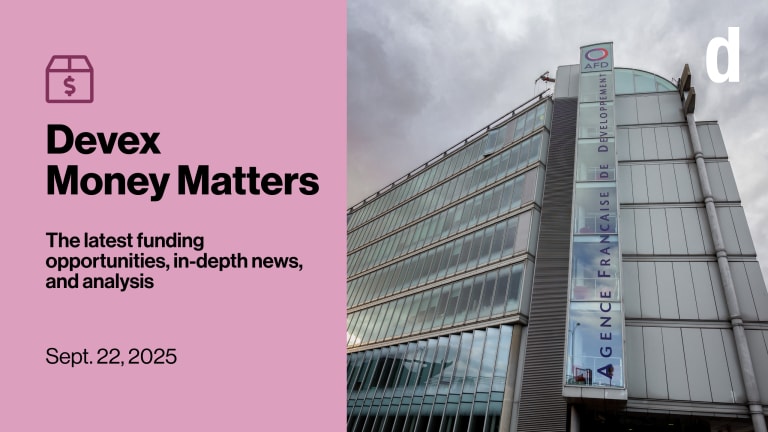
This is a preview of Newswire
Sign up to this newsletter for an inside look at the biggest stories in global development, in your inbox daily.
Devex offices are closed this week for a summer break. Instead of our regular Newswire, we are bringing you deep dives into some of this year’s key development topics. Today, I look at how the development community has responded to calls to decolonize aid.
This past year has been dominated by crises — COVID-19, the ongoing conflict in Ethiopia, the return of the Taliban in Afghanistan, and the long road to post-earthquake recovery in Haiti. Amid funding cuts and rising needs, discussions on the nature of aid have taken center stage, resurfacing the question: How can aid be decolonized?
At Devex, we have approached this question from various angles: We have covered how the response to the pandemic reflects age-old colonial mindsets in global health, and we continue to ask how organizations are attempting to address systemic racism. In the weeks to come, we’ll be looking at how the development sector’s promise to decolonize aid will play out in Afghanistan, where local aid workers will be faced with a threat to their work and their lives.
The idea of decolonizing aid can take many forms in action: from localized leadership in programs on the ground to increased funding. But fundamentally, decolonization means decision-making is in the hands of the people directly impacted by aid and development programs.
Vaccine passports: Problem or solution?
In a world of vaccine passports, who will gain and who will lose? Only 1.4% of people in low-income countries have received at least one COVID-19 vaccine dose. Efforts to restrict people’s movements based on whether they have received a COVID-19 vaccine are heightening concerns about inequities that have already been revealed or exacerbated by the pandemic.
Some experts are advocating that we should ensure vaccine equity instead.
“Otherwise we are creating another superstructure or colonial hierarchy of people from wealthier countries having access and poorer countries not having access,” says Dr. Joia Mukherjee, chief medical officer at Partners in Health. “The necessity of decolonization is making sure that local expertise is recognized and enhanced and empowered in a way to mitigate the harm that would be done by this global downturn.”
Will vaccine passports sharpen a global divide created by a few high-income countries hoarding the world’s vaccine supply? Andrew Green seeks answers.
+ Read more on how the exclusion of the Serum Institute of India’s Covishield vaccine from the EU’s digital COVID certificate may increase inequities around the rollout of COVID-19 vaccines globally.
Battling institutional racism
In July, two consultants at UNICEF UK quit, accusing the organization of institutional racism.
Fifa A Rahman, principal consultant at Matahari Global Solutions, said she faced discrimination because of her Malaysian birth name, Nur Afifah Binti A Rahman, and institutional hurdles which made it impossible to continue working.
“I won’t stand for racism in global health. No Black or Brown person should,” she tells Will Worley.
The organization has also made a policy decision to not hire from outside the United Kingdom. At a time when decolonization remains a key theme in global health, practices such as these effectively prohibit UNICEF UK from working with organizations from the global south.
Read: 2 consultants accuse UNICEF UK of 'institutional racism'
#AidToo: Oxfam’s journey
Last year, calls to decolonize aid spurred organizations such as Oxfam into action. The scandal-hit organization was in the process of introducing structural reforms that would help gain trust back from the community.
Oxfam had been banned from bidding for U.K. government contracts since February 2018, owing to sexual exploitation allegations in Haiti. In a report published three years later, the Charity Commission applauded the organization’s efforts and it was allowed to bid for government funding again.
However, two months later, new allegations resurfaced. This time, of sexual abuse by employees in the Democratic Republic of Congo, making the British government resurrect its funding ban.

Is the aid industry capable of change? The spotlight is on Oxfam — but many other international organizations are also grappling with the question.
Find out more with this in-depth Pro story, which is part of our ongoing #AidToo investigation.
Changing landscape
As the development sector increasingly embraces the language of decolonizing aid, the terminology is showing up in job postings.
Adeso, which is looking for a director of programs and operations, says this in its posting:
“Adeso has programs in Somalia along with global programs to decolonize and transform the humanitarian and development aid architecture. If you are passionate about the movement to decolonize the aid system and want to be part of a dynamic organization continuously pushing boundaries and providing thought leadership in the space, Adeso is the right place for you.”
How much of it is put into action, and what that actually means on the ground remains to be seen.
Have you seen aid decolonization language adopted in new spaces? Send me a note.
More on shifting power in aid:
• The post-pandemic NGO
• What's stopping localization in the humanitarian sector?
• Localized development and the future of aid
• Opinion: 5 ways to decolonize global health and build greater equity
• Q&A: 'Global health funding is far from being decolonized,' says Ngozi Erondu
• Opinion: It’s time to revolutionize aid culture and fund African women
Sign up to Newswire for an inside look at the biggest stories in global development.








